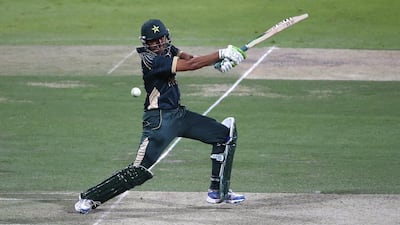Less than a week after returning to Pakistan’s ODI squad and hours before Pakistan’s first ODI against England in Abu Dhabi, Younis Khan announced his retirement from the format.
Just two days ago, speaking to The National, he had said: "I can leave at anytime. I am trying to — whenever I feel is right — leave on my own terms and conditions. At the age I am at, I have to decide very quickly what I want to do."
Few would have guessed he would decide this quickly though and he had given no indication it would be as soon as the first ODI. The decision leaves Pakistan’s selectors looking a little foolish: in the build-up to the selection, chief selector Haroon Rasheed had argued long and hard that Younis’ experience was needed for tough foreign ODI challenges.
“I am proud to announce that after playing for Pakistan for 15 years I am announcing retirement,” Younis said in a statement. “I consulted my close friends and family members before taking this decision. As a batsman I played a positive role in the team’s wins in one-day cricket and now I realise that it’s time to keep myself away from limited overs cricket.
“I hope that the young player who takes my place will keep the traditions which I have set on never compromising over discipline and fitness. I thank all my teammates and team management for their cooperation throughout my career.”
MORE PAKISTAN v ENGLAND NEWS
Poll: Pakistan v England — what will be the result of the ODI series?
Feature: Nine new players to watch during the Pakistan v England ODI series
Preview: England enter ODI series showing clear signs of progress but same cannot be said of Pakistan
It brings to an end an ODI career that rarely touched the heights of his Test career. His early years in the format were stifled by a position at the lower end of the middle order — as he argued fiercely in the interview this week, he was often left with few overs to play. With a game based on smart running and angles, as opposed to pure power, he struggled to find a role.
He did not actually make his first hundred until as late as 2004 (against Hong Kong), in his 103rd ODI. But of the 99 innings he played in that stretch, 65 were at No 5, 6 or 7, positions not suited to his style.
His most fruitful period came soon after, however, and it was no surprise it coincided with a move up the order. For three years, from the start of 2006 to the end of 2008, he was an integral part of the side, averaging nearly 43 in 55 games with five hundreds and 14 fifties. His strike rate was impressive too, just over 82.
Forty-three of the 54 innings came at one down, a position where he played his best innings. The first, a hundred in Southampton, set Pakistan up to chase 272; 117 in Mohali saw them chase 322.
The last six years, from 2009, however, brought meagre returns. Perhaps the captaincy, which he took on in 2009, affected him. Most likely the ensuing instability of his career — relinquishing the captaincy, a long ban — contributed to the downturn. It also felt that as 50-over batting evolved from the arrival of Twenty20, Younis the batsman felt out of place in the evolution.
Though he played mostly at three or four, there would be only one further hundred (that too last year) in that stretch; since 2009, he has averaged just 25 in the format.
Not that he ever thought he was out of place. On Tuesday he argued there was still a place for batsmen such as him in the format.
“Every country has such players, who play the anchor roles for their teams,” he said. “Because of them the team can always get to a respectable total. Not me necessarily, but that kind of player. Every team has one or two.
“Cricket is still the same — some teams get stuck, two, three players get out so you need someone to hang in there. India has, England has, Australia too. They have players around them who give him comfort by playing aggressively. A decent total in ODI cricket is not 450 — it is 300-350. If you want to do that, you have 300 balls, you don’t need to play at 10 an over, you play at 7-7.5. If you get that much, you have a fair chance in a game.”
On Wednesday as he walked out on to the field in colours one last time, he was given a guard of honour by his team. Strange as it may sound, that is probably what he has been looking for over the last couple of years as he has dragged on his ODI career: an exit on his own terms, feted by his teammates.
Whether the selection committee feel quite as pleased, having brought him back into the squad for what they thought was for at least the medium-term, is another question.
FOLLOW US ON TWITTER @NatSportUAE

